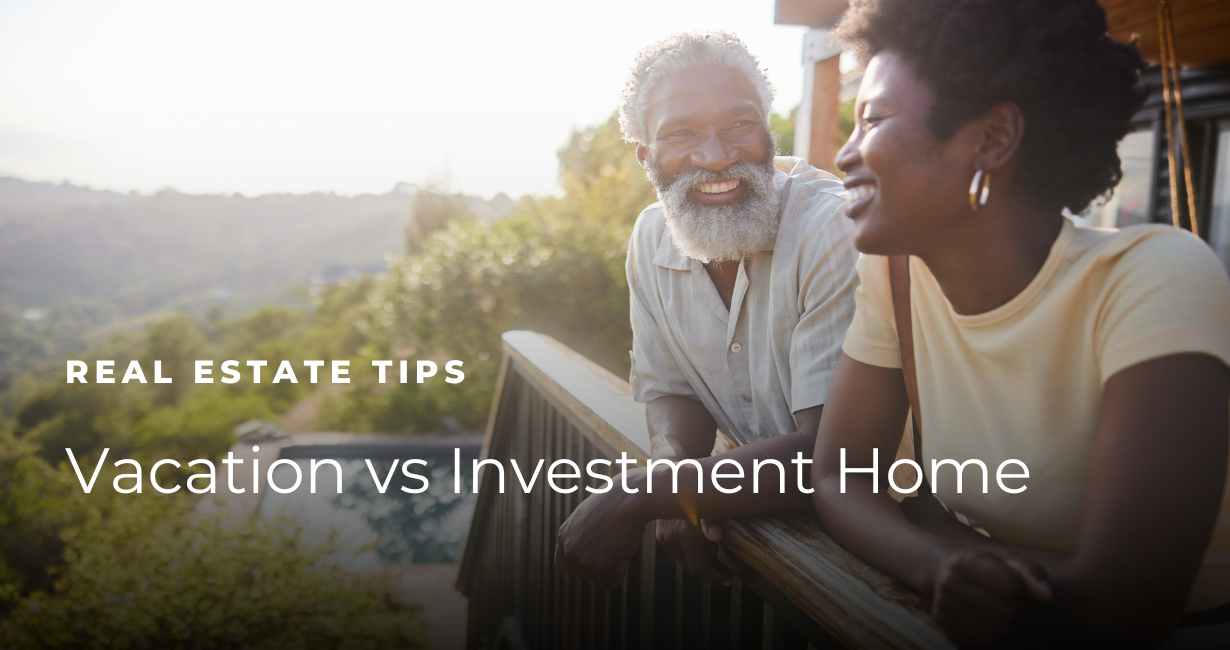Vacation vs Investment Home
Posted by Marketing on Friday, January 5th, 2024 at 11:00am.

Are you a homeowner who plans to purchase your second home in 2024? If so, you will be applying for a mortgage under different circumstances than those under which you bought your first home. Securing a loan for a second home is more complicated, more difficult, and even includes two separate sets of rules - one for vacation homes and another for investment properties.
Let’s examine these two types of homes, the rules that govern them, and the pros and cons of each approach when it comes to your finances.
What Qualifies as a Vacation Home?
Your primary residence is where you’ll spend most of your time, of course, but you are permitted to have one or more vacation homes as well, or even a residence that you use as your office. Either way, your second home will be the place you only occupy for part of the year.
According to the IRS, your vacation home will be somewhere you must live at least 15 days per tax year, or more than 10% of the year. This doesn’t mean that you are forbidden from generating income through your second home; rather, this cannot be the only way you use it. Renting out your property the rest of the year, whether through AirBnB, a property management company, or independently, is permitted—but read through to the end to see our brief overview of the tax implications of this approach.
What Qualifies as an Investment Home?
First, a vacation home is necessarily a single-family unit, whereas investment properties can be as many units as development regulations in your area dictate. When one purchases an investment property, one does so with the stated goal of earning a profit, whether through renting them out or flipping them for an advantageous quick sale. If the area in which you buy has zoning that allows, you could even purchase an investment property and rent it out as a commercial space.
Clearly, you are not required to stay in your investment property at all, or even reside in the same state. Your goal will be to have your investment property pulling in profits all year long.
Ideally, your property will appreciate over time, further increasing your profit margin.
Securing Funding for a Second Property
When you apply for your mortgage, you will be asked whether you plan to use this property as a primary residence, a vacation home, or an investment property.
Securing funding for a primary residence is comparatively both easier and less expensive than either of the alternative uses. As a purchaser of your primary residence, you were given access to lower interest rates and the minimum down payment requirements. The requirements for second properties are more stringent.
When faced with financial difficulties, homeowners will invariably choose to pay the mortgage on their primary residence rather than either their vacation or investment properties. Consequently, your lender will want to see a lower debt-to-income ratio and an excellent credit rating. Even so, your down payment requirement and interest rate will be higher.
The Risks of Not Being Honest with Your Mortgage Lender
Because of the slight advantages of funding vacation homes over investment properties, a very few will mislead their lender by misstating their intended use for their purchase. We strongly caution you against this course of action because it will inevitably be discovered and cause you to be liable for having committed fraud.
When the benefits are compared with the consequences, no rational individual would attempt to pull off such a dishonest maneuver. Instead, we advise our clients to be honest with their lender at all times, because it will always work to their benefit.
In fact, describing your intended uses for this property in precise detail is the best way to secure the type of loan that was created for your needs.
Tax Implications of Vacation vs. Investment Home
Before we share our experience in this realm, you should know that only your financial advisor or qualified CPA can give you accurate financial advice for your situation. We are real estate professionals and are therefore unable to offer financial advice.
With that said, it is true that when one owns an investment property, one can take advantage of several tax deductions to offset the costs of ownership and operating expenses, including insurance, maintenance, property taxes, mortgage insurance, utilities, potential depreciation, and loss of value resulting from damage.
Vacation homes can generate rental income, as stated above, but only for the interest paid on the loan. One can limit the percentage of rental income that can be taxed by deducting the same expenses they would on their primary residence, but the long list of deductions will not be the same.
The Takeaway
In addition to the differences between primary residences and additional properties, there are further differences between those used as vacation vs. investment homes. From loans to taxes, there are a great deal of considerations that must be weighed when choosing the best route to take for your financial situation.
We recommend speaking with your financial advisor or qualified CPA before you pursue either option, after which you’ll take a detailed plan to your lender. Whatever you do, you must be fully honest with your lender.
Finally, when you’re ready to pursue your second property, we're here to make sure you find just what you’re looking for. Tell your real estate agent everything you can, then simply relax and get ready to enjoy a profitable partnership.







